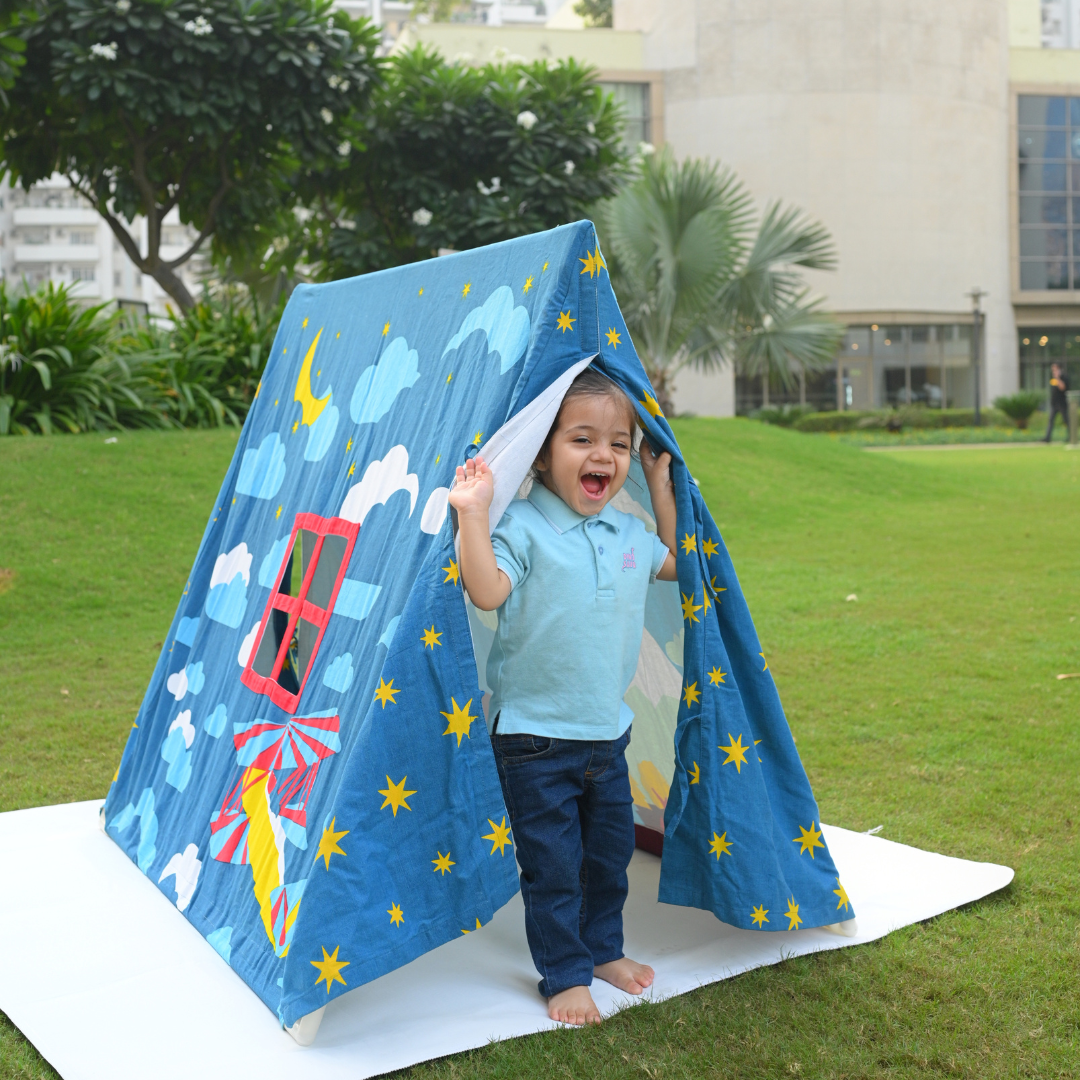In today’s fast-paced world, where children are constantly surrounded by technology, it’s easy to forget the value of simple, imaginative play. As parents, we’re always on the lookout for ways to nurture our children’s development, and sometimes, the best solution is as simple as a play tent. These cozy, whimsical structures, often overlooked in favor of the latest gadget or trendy toy, hold incredible potential for fostering both independent play and social skills in children.
At Happy Matty, the focus is on providing quality toys and activities that encourage creativity, learning, and meaningful play. Play tents are among the most beloved products, offering more than just a fun hideaway. They create an environment where children can explore, socialize, and grow in ways that many other toys simply cannot. Let’s explore how play tents can encourage independent play and the development of social skills, helping children thrive in a world that often demands more than they are ready for.
The Magic of Independent Play
As children grow, one of the most important aspects of their development is learning how to entertain themselves. Independent play, which involves a child engaging in an activity without direct input from an adult, is crucial for fostering creativity, problem-solving, and emotional regulation. Play tents are the perfect environment for cultivating this kind of play, providing children with a safe and imaginative space where they can explore their interests without interruption.
When a child steps into their play tent, they enter a world of their own. Inside these little hideaways, kids can pretend they are explorers on a faraway island, astronauts floating in space, or even princes and princesses in grand castles. This imaginative play allows children to express themselves freely, exploring different roles and scenarios that might be difficult to do in the real world. It’s in these moments of quiet solitude that children begin to develop their ability to entertain themselves, which is a skill that can serve them well throughout their lives.
For parents, a play tent offers the perfect solution for those moments when you need a break, but don’t want your child to feel neglected. The tent becomes a sanctuary for children, where they can lose themselves in their imagination and enjoy a sense of autonomy. And while it’s easy to assume that independent play means being left alone, it actually encourages children to become more self-reliant. They learn to entertain themselves, solve problems on their own, and manage their emotions when things don’t go according to plan.
Encouraging Creativity and Cognitive Development
The beauty of independent play within a play tent is that it sparks creativity in a way that few other toys can. When children have the space to make up their own rules and invent their own stories, they engage their minds in a manner that builds cognitive skills. The act of creating imaginary worlds within the walls of their play tent allows children to explore different problem-solving strategies, expand their vocabulary, and practice memory recall. This level of cognitive engagement is essential for brain development and academic success.
In many ways, play tents are like blank canvases for a child’s imagination. They are not bound by predefined rules or rigid structures. Instead, they provide an open-ended space where anything is possible. Whether they are playing alone or with friends, children are encouraged to think critically and creatively. They decide what happens next, how the story unfolds, and what roles each character plays, which nurtures their decision-making abilities and strengthens their imagination.
This type of play also gives children the opportunity to practice executive function skills, such as planning, organization, and focus. These are the skills that help children manage tasks, set goals, and accomplish what they set out to do. Play tents naturally encourage these skills by giving kids the freedom to organize their environment, whether it’s arranging pillows to create a cozy corner or setting up a pretend store within the tent. The choices they make while engaging in play help them strengthen their ability to focus and work through challenges.
The Role of Play Tents in Social Skill Development
While independent play is critical, social interaction with peers is equally important in a child’s development. The beauty of play tents is that they offer the flexibility to transition from solitary play to social play with ease. Whether shared with a sibling or a friend, play tents create a space where children can work together, negotiate roles, and engage in cooperative activities.
When children play in a tent with others, they naturally begin to learn about communication, cooperation, and empathy. They must navigate the dynamics of group play, which can include negotiating who gets to be the “king” or “queen,” deciding on the rules of a game, or simply sharing the space. These social interactions are vital for learning how to work as a team, share resources, and respect the feelings and opinions of others. In a play tent, these lessons happen organically, without the need for formal instruction.
Furthermore, play tents allow children to practice conflict resolution. When two children argue over a toy or a turn in the tent, they must learn how to express their feelings, negotiate a solution, and make compromises. These skills are essential for building healthy relationships and learning how to function as part of a group. The enclosed, intimate nature of a play tent provides a low-pressure environment for children to experiment with different social roles and behaviors, helping them become more confident in their interactions with others.
Parents often notice that their children develop deeper bonds and friendships after spending time playing together in a shared play tent. It’s a space that promotes connection and cooperation, creating memories and experiences that foster stronger social ties. As children grow older, these skills—such as negotiation, empathy, and teamwork—become more refined, helping them build relationships both in and out of school.
Building Emotional Intelligence Through Play
In addition to fostering creativity and social skills, play tents also offer a unique opportunity for emotional growth. When children play in their tent, they can freely express a range of emotions, from excitement and joy to frustration and sadness. This emotional exploration is essential for developing emotional intelligence, which is the ability to recognize, understand, and manage one’s emotions.
Because play tents provide a private and secure environment, children feel safe to experience and express their feelings. For example, a child might create a scenario where their toy gets lost or their character faces a challenge. These moments of imaginative play allow children to confront difficult emotions in a low-risk setting. They can practice calming themselves down when things go wrong, work through frustration, and even create positive outcomes in their stories.
This type of emotional regulation is critical for a child’s overall well-being. The ability to manage emotions, adapt to changing circumstances, and cope with setbacks is not only important for social interactions but also for success in school and life. Play tents, by encouraging free expression in a controlled environment, help children develop these essential emotional skills at an early age.
Play Tents: A Gateway to Active Play
While play tents offer a cozy space for imaginative and emotional exploration, they can also inspire more active play. Many play tents come with additional accessories such as tunnels, slides, and other interactive elements that encourage physical movement. This added layer of activity is crucial for a child’s physical development, helping them build strength, coordination, and motor skills.
Active play within a tent encourages children to use their bodies in a way that supports healthy physical development. They may crawl through tunnels, climb over pillows, or leap into the tent, engaging both their gross and fine motor skills. This movement, in turn, enhances their sense of body awareness, balance, and agility—skills that are important for everyday tasks and overall fitness.
Suggested Reading: The Science Behind Deep Sea Blue Absorbent Bibs: What Makes Them So Effective?
The Happy Matty Difference
At Happy Matty, play tents are more than just fun playthings—they are tools for growth and development. Designed with care and attention to detail, these tents are made to provide a safe and stimulating environment where children can explore, create, and connect. By offering products that support independent play, encourage social interactions, and nurture emotional intelligence, Happy Matty helps parents give their children the best start in life.
Whether you’re looking for a simple tent for your toddler to retreat into or a more elaborate structure for your older child, Happy Matty offers a wide range of play tents that cater to different age groups and preferences. Each product is crafted to foster creativity, build essential life skills, and ensure hours of fun. In a world filled with distractions, Happy Matty’s play tents remind us of the importance of play and the lasting impact it can have on a child’s development.
In conclusion, play tents are not just toys—they are gateways to essential developmental skills. By encouraging independent play, fostering creativity, and promoting social interaction, they provide children with the tools they need to grow into confident, capable individuals. Whether used for solo adventures or shared with friends, play tents offer an endless array of possibilities for young minds to explore and thrive. So, the next time you’re looking for a way to support your child’s development, consider a play tent from Happy Matty and give them the gift of imaginative play that lasts a lifetime.
Explore the range of play tents at Happy Matty Store and discover the joy of independent play and social skill development.



